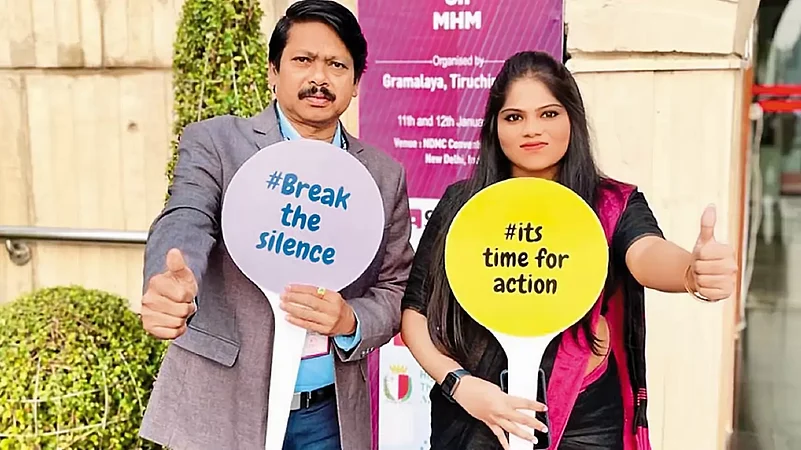A transformative movement promoting menstrual equity and environmental sustainability is quietly unfolding in the country. Led by Gramalaya, a key resource centre of the Ministry of Jal Shakti, the initiative added a feather to its cap with the declaration of India’s first menstrual waste-free village, ATK Nagar, in Pudukkottai district, Tamil Nādu, in 2019. It has since followed it up with 178 villages in other parts of the state and Puducherry, thereby empowering villages and communities, transcending generations.
Nationwide, millions of adolescent girls and women have since engaged in conversations about menstrual hygiene and changed their practices during menstruation. Additionally, the programme has successfully shifted the menstrual hygiene choices of lakhs of women and girls from conventional single-use plastic pads to eco-friendly reusable cloth menstrual pads, contributing to environmental sustainability.
Furthermore, during the Covid-19 pandemic, the response reached over 50,000 women and adolescent girls with hygiene essentials. This journey is marked by the tireless efforts of rural women, meticulously trained to disseminate menstrual hygiene education at the grassroots level.
Menstruation remains a taboo subject in many parts of India. The shame and stigma associated with menstruation can prevent girls and women from seeking help or discussing their menstrual health openly. Cultural and religious factors can significantly influence menstrual practices. Some communities may have traditions that stigmatise menstruation or isolate women during their periods, making it difficult for girls and women to manage their menstruation with dignity. Period poverty is a significant and pervasive issue in India, affecting millions of women and girls nationwide. It refers to the inability to access and afford menstrual hygiene products and proper sanitary facilities.
Many women and girls, particularly in marginalised communities, resort to using unsanitary and unhygienic alternatives such as rags, dirty clothes, newspaper, ash, sand or sometimes nothing during their periods to absorb the period blood, leading to a higher risk of infections and health issues. The consequences of period poverty extend beyond physical health, as it often forces girls to miss school, limiting their educational opportunities and perpetuating gender inequalities.
Menstrual hygiene management or menstrual health and hygiene refers to access to menstrual hygiene products to absorb or collect blood flow during menstruation, privacy to change the materials and access to facilities to dispose of used menstrual management materials.
Towards eco-friendly solutions
Widely used, disposable sanitary pads can have several side effects and negative impacts on women’s health and the environment. These pads often contain chemicals, fragrances and artificial materials, leading to skin irritation, allergies and discomfort during menstruation. Prolonged use of such pads may increase the risk of vaginal infections due to reduced breathability.
The Menstrual Hygiene Management Programme spearheaded by Gramalaya is a response to a dual crisis of the environmental challenges caused by single-use plastic sanitary pads and the dire need for women’s health and hygiene education in rural India.
Gramalaya’s mission is to educate, empower and emancipate women from all menstruation-related health issues and make sustainable menstrual products affordable and accessible to everyone in India. The transformation involves uniting stakeholders, transcending social norms, and improving the lives of countless women and girls.
Environmentally, the production and disposal of these single-use pads contribute to pollution and waste, as they can take 500 to 800 years to decompose. This issue of menstrual waste, particularly disposable sanitary pads, has long posed significant environmental and health challenges. When disposed of improperly, these pads can harm the ecosystem and human well-being.
Firstly, when disposable pads are discarded openly, they become a health hazard for animals and birds that may ingest or come into contact with them. In addition, improper disposal in water sources such as ponds, lakes and rivers not only contaminates these vital ecosystems but also affects aquatic life and endangers drinking water quality.
Secondly, the manual burning of sanitary pads emits harmful pollutants into the air. The burial of these pads can prevent rainwater from percolating into the ground, affecting groundwater recharge and leading to water scarcity issues.
Switching to reusable cloth pads is a significant step in mitigating these issues. Reusable pads reduce waste as they can be washed and used multiple times, reducing the environmental impact. They also eliminate the need for open disposal, burning or burial, addressing the associated health risks. This shift to eco-friendly menstrual products is not just a change in products; it is a conscious choice to protect our environment, promote better health and contribute to a more sustainable future.
Perhaps the most impactful aspect of this menstrual hygiene management programme is the shift it has inspired in menstrual hygiene choices. Over 200,000 women and girls in India have transitioned from conventional single-use plastic pads to washable and reusable eco-friendly cloth pads.

Period-Friendly Toilet Complexes
Gramalaya, with the support of donors and corporate social responsibility funds, promoted 717 period-friendly toilet complexes and menstrual hygiene management education in schools across multiple states in India. These facilities provide a safe and private space for girls to manage their periods and incinerators for the hygienic disposal of used sanitary pads. Implementing these period-friendly toilets has significantly reduced absenteeism and dropout rates in the schools where these facilities were introduced.
Gramalaya recognised that transformation could not happen in isolation. Thus, it collaborated with the Dettol Banega Swasth India programme by Reckitt to host the Third Menstrual Hygiene Management Summit in New Delhi. This event united over 225 people from all over India, including doctors, activists and government officials.
Sustaining positive changes in menstrual practices is crucial for long-term impact, and it requires ongoing education and continuous efforts. Recognising the need for community involvement, Gramalaya has trained over 2,500 dedicated volunteers enthusiastic about spreading awareness regarding menstrual hygiene management. Through the collective efforts of volunteers and the organisation, more than two million adolescent girls have engaged in conversations about a traditionally taboo topic. These conversations have empowered them to change their menstrual hygiene practices positively.
Championing Resilience During the Pandemic
When Covid-19 hit, things got tough in the country. The lockdown measures and restriction on mobility made it difficult for them to access essential items like sanitary pads, often available at local shops. The economic fallout of the pandemic hit marginalised communities particularly hard. Many families needed help to make ends meet, and purchasing sanitary pads became a lower priority for people when compared to essential food and medical supplies.
S. Damodaran is founder, Gramalaya and Padma Shri awardee.





















